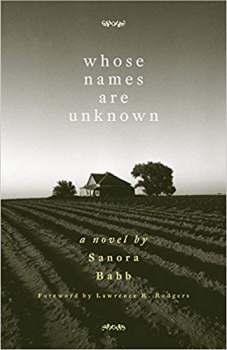John Steinbeck
Penguin, 1992 (originally published 1939)
619 pp.
Whose Names are Unknown
Sanora Babb
Univ. of Oklahoma Press, 2004 (written in 1939)
222 pp.
In my quest to read many of the classic novels, I at last read "The Grapes of Wrath", about the Dust Bowl of the 1930s in America. Then while doing some research on the book, I stumbled across another novel which covers the same topic, "Whose Names are Unknown". Although published 65 years apart, they were both written during the Dust Bowl by authors who visited the migrant camps. Sonora Babb was a Farm Security Administration (FSA) worker who took notes about conditions in the California camps set up to house the migrants fleeing the Dust Bowl. The FSA shared these notes with John Steinbeck when he toured the camps. Babb's novel was under contract to be published but was cancelled due to the wide acclaim that Steinbeck's novel garnered. In 2004, Babb's book was rescued from the archives and published by the University of Oklahoma Press.
As a Classic, "Grapes of Wrath" has been critiqued and analyzed many times by authors more scholarly than I am. But I would like to discuss these two books as companion works about an important piece of American history which seems relevant to the world of today.
For me "The Grapes of Wrath" was a slow read, because it was so sad. I liked the book enormously and I can understand that it is great writing, but that's how it made me feel: sad for the individual members of the Joad family, sad for the thousands of people displaced during the Dust Bowl, sad for an America that let this happen. And the characters, no, the people have stayed with me. Critics may call them wooden or cardboard, but as a reader they were very alive to me, each with their own characteristic way of talking and thinking and acting. Some characters were, of course, more distinct, more clearly defined, than others, but only a few were marginal. This is my entry in the Back to the Classics 2018 Challenge, a classic that scares you.
When I read "Whose Names are Unknown" I was prepared for sadness, and it, too, is very sad. The Dunne family and their friends are poor but proud people, determined to escape the Black Blizzards and find a better life in the "promised land" of California. The basic story of their trip is similar to that of the Joads, but told in a much different style. Besides working in the camps, Babb was a native of Oklahoma's arid panhandle and knew about the desperate conditions in both places. The tale is narrated by the mother and is a more intimate, less violent story. Bad things do happen on their journey, but they are more in the background; we don't get blow-by-blow accounts of the violence.
I thoroughly enjoyed both novels despite the sadness quotient. If you've read Steinbeck's you should also read Babb's. Especially since during the current worldwide migrant crises, these evocative books are still relevant.
FURTHER READING
Sanora Babb
http://www.sanorababb.com/
Dust Bowl
https://en.wikipedia.org/wiki/Dust_Bowl
[T]he Farm Security Administration hired numerous photographers to document the crisis. Artists such as Dorothea Lange were aided by having salaried work during the Depression. She captured what have become classic images of the dust storms and migrant families. Among her most well-known photographs is Destitute Pea Pickers in California. Mother of Seven Children, which depicted a gaunt-looking woman, Florence Owens Thompson, holding three of her children. This picture expressed the struggles of people caught by the Dust Bowl and raised awareness in other parts of the country of its reach and human cost.
Many of the songs of folk singer Woody Guthrie, such as those on his 1940 album "Dust Bowl Ballads", are about his experiences in the Dust Bowl era during the Great Depression when he traveled with displaced farmers from Oklahoma to California and learned their traditional folk and blues songs, earning him the nickname the "Dust Bowl Troubadour". --Wikipedia
"The Dust Bowl" (2012) is a documentary film directed by Ken Burns which aired on PBS in 2012. The four-part miniseries recounts the impact of the Dust Bowl on the U.S. during the Great Depression of the 1930s. Available on DVD - check your library!
https://en.wikipedia.org/wiki/The_Dust_Bowl_%28film%29
The film "The Grapes of Wrath" (1940) stars Henry Fonda as Tom Joad and Jane Darwell as Ma Joad. Considered one of the best movies ever made, but it does change the plot in significant ways.
https://en.wikipedia.org/wiki/The_Grapes_of_Wrath_%28film%29
 | ||
| Dust Storm in Texas 1935 |





No comments:
Post a Comment